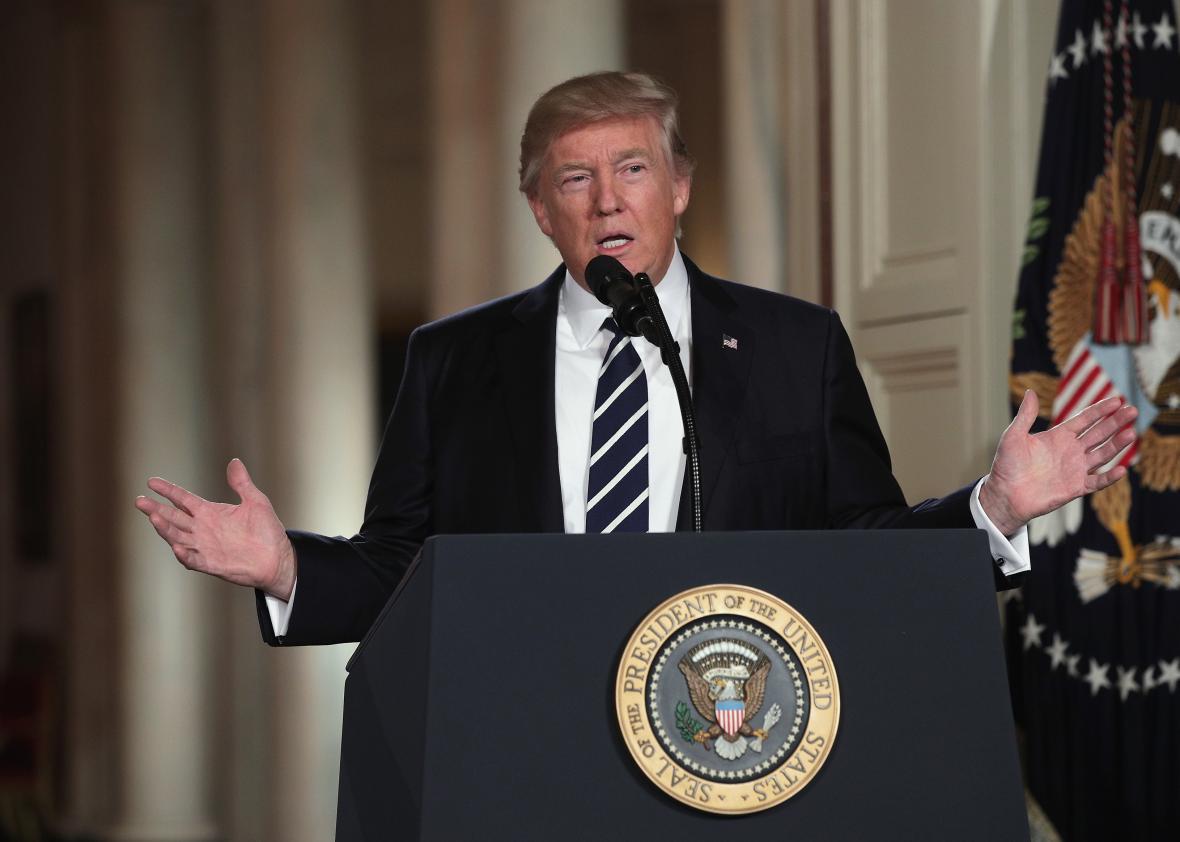“So was that a surprise? Was it?”
Those were President Donald Trump’s first words after inviting his Supreme Court nominee to join him on stage on Tuesday night.
Those of us who have been trying to make sense of the Trump era are consistently forced to ask ourselves unanswerable ontological questions: What is a surprise? What is real? What is a distraction? In a sense, the answers are unknowable, which makes the questions even more terrifying. But every once in a while, the thing that is the distraction is also the thing that’s real. On Tuesday night, we watched what appeared to be a flashy reboot but was in fact just the latest variation on a tedious old theme. Given what we already know about Donald Trump, it was the least surprising announcement of a Supreme Court justice in the modern history of the court.
The atrocity you witnessed Tuesday night—the president of the United States setting it up to appear as though he was summoning in two esteemed jurists for a Bachelor-style rose ceremony in prime time—isn’t just another shiny object meant to distract you from Steve Bannon, or from the Muslim high-schooler who has been detained for three days, or from the repeated instructions from Sean Spicer that anyone who doesn’t show perfect loyalty to the president should get out of government. The grotesque power move of embarrassing two judges with a showy prime-time bake-off (“I’m not here to make friends”) isn’t just a distraction from President Trump’s contemptuous dismissal of the law, the judicial branch, and the Constitution. It’s a capstone to a yearlong campaign to show dominance over them.
We already know how Donald Trump feels about judges, considering his incomparable racial slight of Gonzalo Curiel during the campaign, his unprecedented promises that his judges would have preformed commitments to Trump’s ideological agenda, his contemptuous insults of John Roberts, and his gleeful participation in the grave insult done by Republicans to Merrick Garland, who was just as mainstream and worthy a candidate as Trump’s pick but was never even granted the courtesy of a hearing or a public discussion of his record.
And we already knew how Donald Trump feels about the Constitution. It’s only ever been a glittery annex to Trump Tower, a useful shiny thing to talk about in sloppy generalities, with a jurist on top sporting a red baseball hat. Nobody should be surprised that in dismissing the acting attorney general on Monday night, Trump’s announcement used the word betrayal, as though she had sworn an oath to him rather than our nation’s founding document.
We could of course talk about the new nominee’s merits and drawbacks as a jurist. But to do so would be to accord him the respect of being a serious nominee, respect that was not afforded his brother Merrick Garland. I imagine that was as embarrassing for the new nominee as it was for Judge Garland and the rest of the judicial branch. But if the lesson of the new Trump era is that law is nothing more than power and loyalty, it stands to reason that the enduring lesson of the Judge Garland episode will be that law is nothing more than power and loyalty.
It is the responsibility of the judicial branch to stand between wrongdoing and complicity. In a powerful opening sentence in a concurrence at the appellate level in the Hobby Lobby case, we were reminded of just that: “All of us face the problem of complicity. All of us must answer for ourselves whether and to what degree we are willing to be involved in the wrongdoing of others.”
The author of that sentence was the president’s nominee for the Supreme Court. At no point in history has that question been more important for our judicial branch than today.
So instead of seeing Tuesday’s spectacle as some new atrocity, understand that it represents more of the same: Donald Trump’s complete misapprehension of judges and what they do; the subordination of a judicial branch that is not in a position to fight back; self-referential shows of dominance over the courts and the law, institutions that—as we are quickly discovering—have laughably few weapons to protect themselves beyond the esteem of the public.
If you are laughing at the glitter of Tuesday’s prime-time rollout, please understand that it isn’t a distraction from the seriousness of Donald Trump’s all-out war on the rule of law. It’s a symbol of it.
